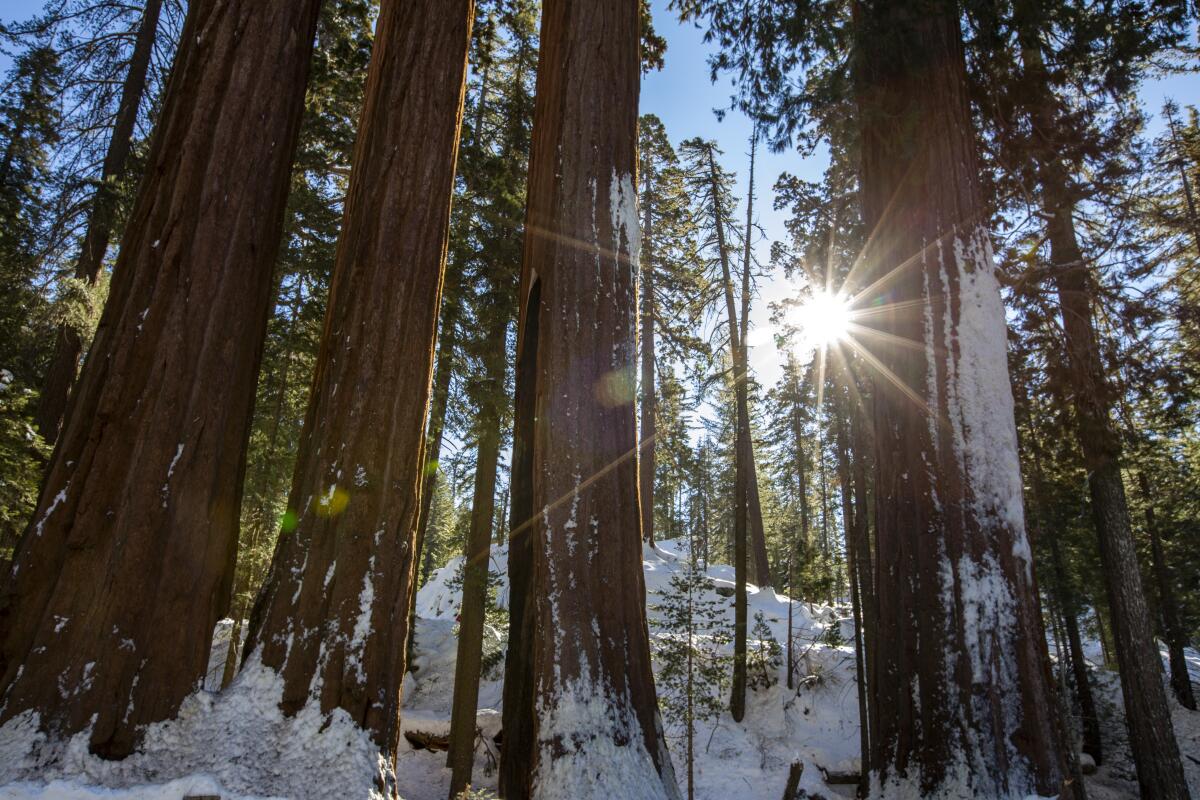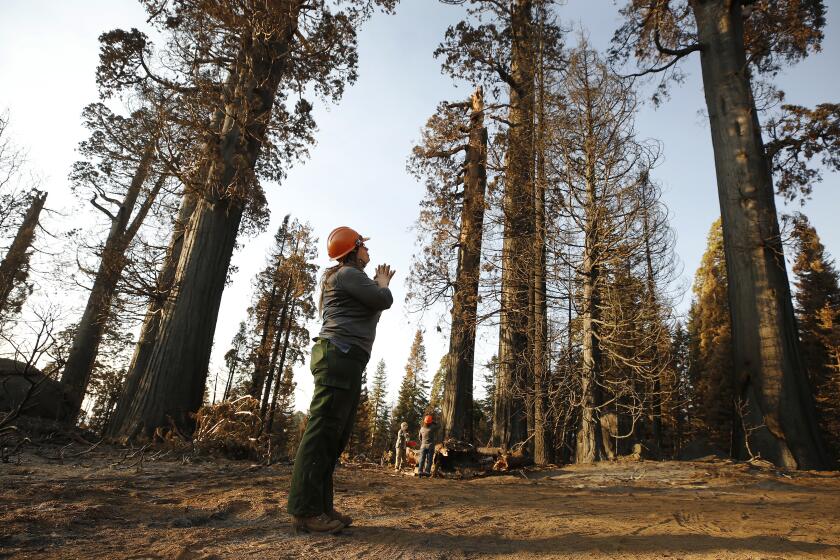Kevin McCarthy has a bill to save the sequoias, but some environmental groups aren’t into it

- Share via
WASHINGTON — In November 2021, during a plane ride from Qatar to Washington, D.C., Rep. Bruce Westerman (R-Ark.) approached Rep. Scott Peters (D-San Diego) to talk about sequoias.
The humongous trees don’t grow in either of their districts but are considered a national treasure.
Often standing taller than 300 feet, they are the largest trees in the world and only naturally grow on the western slopes of the Sierra Nevada. Some have been standing for over 3,000 years. Their design — the cones of the tree release seeds when exposed to heat — has allowed them to thrive in California’s wildfire ecosystem for millennia, and scientists study them to gain insights into climate history.
The last known large-scale destruction of these trees was in 1297. But since 2015, an estimated 20% of the surviving population has been lost to wildfires.
The intensity of these fires has been exacerbated by hotter and drier climates and decades of the government’s well-intended wildfire suppression policy. The trees could go extinct within the next three decades unless something changes, some researchers say.
During their 45-minute conversation on a plane somewhere over the Atlantic, the Arkansas lawmaker convinced the Californian of the urgency of the threat. From their interaction emerged a rough blueprint for legislation intended to save the sequoias from extinction.
This year’s Castle fire killed hundreds of giant sequoias, the latest in a string of Sierra Nevada wildfires that is taking an alarming toll on the world’s most massive trees.
Today, Westerman and Peters have broad support from both parties, with 24 Democrats and 29 Republicans backing their bill, the Save Our Sequoias Act. Nearly half of lawmakers co-sponsoring the legislation are from California.
Even when a bill has support from both sides of the aisle, getting it passed can be an impossible feat without the Speaker of the House’s blessing. In this case, that isn’t an obstacle: House Speaker Kevin McCarthy is not only supportive of the bill but its chief sponsor.
This session, the Bakersfield Republican is the lead sponsor of just five measures, four of which have already passed the lower chamber. Westerman and Peters’ bill is the last on his docket and could help save the giant trees, many of which are in his district.
The bill would approve $205 million over the next seven years to protect all sequoia groves and codify into law an existing coalition, which includes the National Park Service, Forest Service and the University of California, Berkeley, to oversee much of the process of saving the trees, according to Tom Erb, a climate advisor for Peters.
It would also expedite environmental reviews for grove-protection projects, which often include clearing excess fuel near the groves that can intensify fires.
Despite the bipartisan nature of the bill, it is facing stiff opposition from some groups, including the Sierra Club, the GreenLatinos and the Pacific Crest Trail Assn., who in a letter warned that the proposal would undercut existing environmental protections and “expedite potentially harming logging projects.”
“The legislation is a misguided step in the wrong direction that would remove science and community input from decision-making and would severely undercut bedrock environmental laws,” said the letter signed by 81 groups. The letter warned that the legislation would be a bad precedent and “could actually exacerbate the threat to the Giant Sequoias and our forests.”
Mark Larabee, the director of advocacy for the Pacific Crest Trail Assn., said his group is supportive of the bill’s intent but not its method, saying that by adequately funding existing environmental laws and programs, Congress could save not only the sequoias, but also bolster agencies’ ability to address other dire problems that plague forests.
“These agencies’ job keeps growing and the dollars keep shrinking,” Larabee said, adding that both inflation and underfunding undercut agencies ability to protect treasures such as the sequoias. This bill is a “clever way of trying to weaken the law on the back of a really good cause,” he said. “It’s a slippery slope.”
Supporters of the bill contend that federal agencies do not have enough authority to protect the remaining trees, noting that, at its current pace, the Forest Service would need more than five decades to protect the 19 priority groves.
In an interview, Peters described opposition to the bill as “disappointing.”
Some environmental groups “have become almost as political, in some cases, as Congress itself,” Peters said. “They have adopted this view that that changing the environmental laws or adapting environmental laws is some sort of slippery slope that will violate biblical principles.”
Peters noted that some laws as they were constructed create an inherent time delay. “We cannot get the environmental groups in many cases engaged in how we adapt, how we modernize these laws to deal with today’s threats around forestry or climate change agenda,” he said. “It’s very frustrating.”
He noted that an array of groups are supportive of the bill, including Edison International, the National Congress of American Indians and the Save the Redwoods League.
Still, some environmental groups say that, though the intent of the bill is correct, lawmakers are backing bills that would undermine efforts to fight climate change.
Olivia Juarez, public land program director for GreenLatinos, noted that McCarthy opposes many efforts to combat climate change. “His intentions with this bill don’t match up with how he’s acting,” Juarez said in an interview.
Rep. Doug LaMalfa (R-Richvale) said that in California, fire is inevitable.
“It’s just kind of luck of the draw with where it’s gonna hit,” he said. “Removing the excess material and leaving the sequoias behind is what we’re after so that when fires hit, [the trees can be saved].”
It is unclear when the bill will be up for a vote in the House, and there is no existing companion bill in the upper chamber. The two California senators — Dianne Feinstein and Alex Padilla — introduced similar legislation last year but haven’t committed to supporting the language in the most recent version of the House bill.
The bill would likely need support from at least 60 senators to dodge a filibuster and make it to President Biden’s desk. When asked if Biden would support the bill, the White House referred The Times to a May testimony from Forest Service Chief Randy Moore where he expressed that the “emergency facing giant sequoias is unprecedented” and said the Forest Service appreciated “the intent of the Save Our Sequoias Act.”
More to Read
Get the L.A. Times Politics newsletter
Deeply reported insights into legislation, politics and policy from Sacramento, Washington and beyond. In your inbox twice per week.
You may occasionally receive promotional content from the Los Angeles Times.












